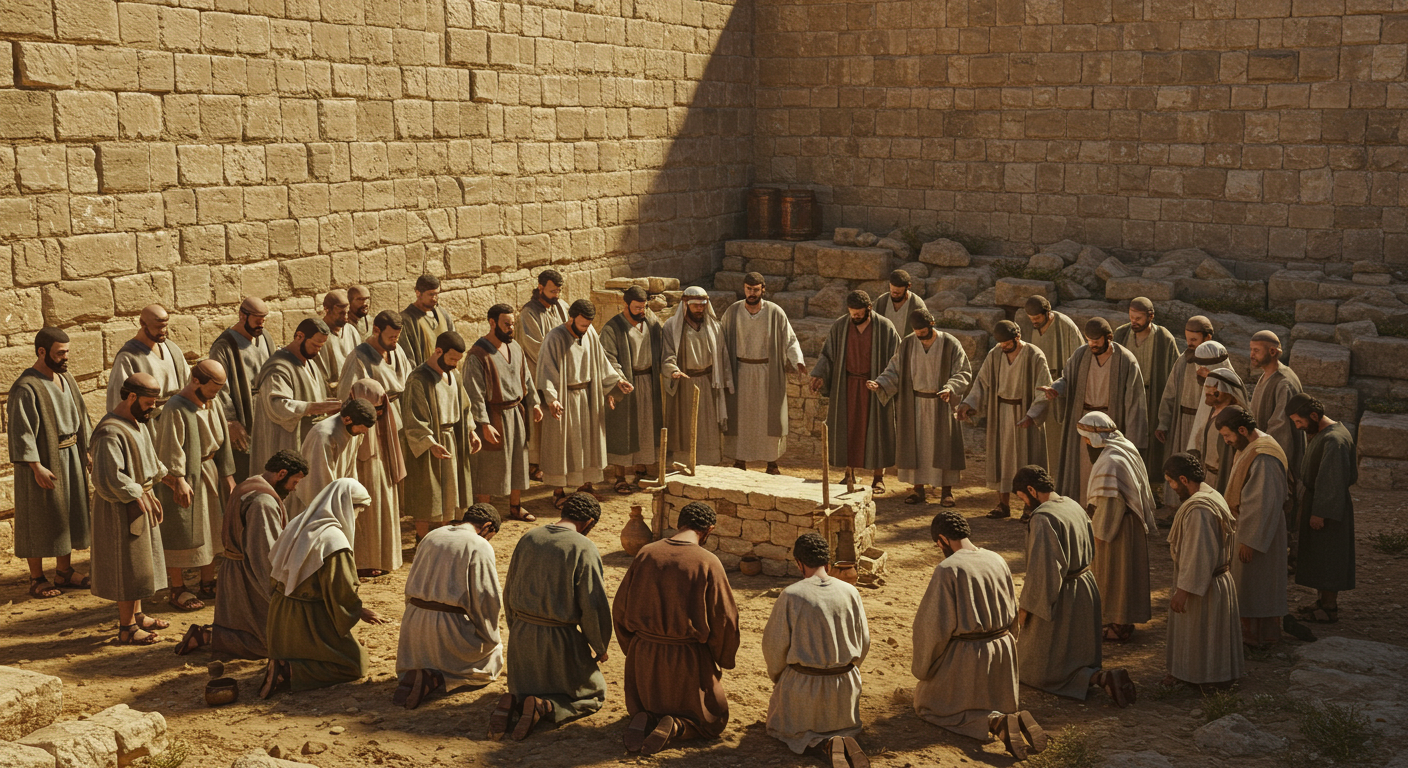Explore Nehemiah 9:5–38: a profound prayer woven with gratitude and confession after triumph. Discover its historical depth and modern relevance here.

The People’s Prayer After The Wall Was Built – Nehemiah 9:5–38
Introduction
In the quiet glow of a newly restored city, amidst the restored stones and renewed hope, a collective voice rises—a prayer, a cry for divine guidance after a monumental task has been completed. Have you ever felt a profound sense of accomplishment after achieving something seemingly insurmountable, only to realize that the journey has just begun? In the narrative of Nehemiah and the rebuilding of Jerusalem’s wall, we encounter such a moment, encapsulated in the people’s heartfelt prayer after the wall was built. The passage of Nehemiah 9:5–38 is a tapestry woven with gratitude, history, and humble supplication. This article will walk you through the historical context of this prayer, dissect its key elements, draw lessons from its depths, and explore how it remains relevant today. Join me as we delve into this enduring prayer and discover what it holds for us now.
Background of the Prayer
To understand the depth of the people’s prayer in Nehemiah 9, we must first revisit the challenging yet dynamic period in which it was uttered. The Israelites, exiled and scattered, had returned to a Jerusalem that lay in ruins. Under the leadership of Nehemiah, a determined cupbearer turned governor, they undertook the daunting task of rebuilding the city’s walls. This was not merely a construction project but a restoration of identity and protection, a symbol of resilience and faith. After the wall’s completion, a jubilant yet reflective mood prevailed among the people. At this juncture, the Levites led them in a prayer of confession and dedication. The significance of this prayer lies not only in its content but also in the collective resolve to seek unity with God after reclaiming their city. It becomes clear how their circumstances—blending triumph with introspection—shaped the heartfelt expressions found in Nehemiah 9:5–38.
Key Elements of the Prayer
Acknowledgment of God’s Majesty
The prayer begins with an acknowledgment of the greatness and majesty of God. The Levites call upon the people to “stand up and praise the Lord your God, who is from everlasting to everlasting” (Nehemiah 9:5). This opening sets the tone by placing God above temporal challenges and emphasizing an enduring relationship that transcends their present circumstances.
Recollection of History
In verses 6-31, the prayer transitions into a detailed recounting of the history of Israel. This is not a mere recitation of facts but an intentional reminder of God’s faithfulness through the ages. The Israelites recount creation, the covenant with Abraham, and the liberation from Egypt, reflecting on how God had continually provided despite repeated disobedience. Each recollection serves to remind the people of God’s unwavering support, even when they faltered.
Confession and Repentance
The prayer is characterized by a deep, communal confession of sin. They acknowledge the failures of their ancestors and themselves, admitting to ignoring God’s laws despite His constant guidance. This confession is articulated not in a tone of despair but of sincere repentance, marking a turn from past disobedience to future faithfulness (Nehemiah 9:33).
Renewed Covenant
The climax of the prayer is a pledge to renew the covenant with God. Recognizing their dependency on divine guidance, the leaders and people alike commit not just to words but to actions that reflect a renewed devotion to God’s commandments. This covenant renewal signifies hope for transformation and an earnest desire for alignment with God’s will.
Lessons We Can Learn
The people’s prayer in Nehemiah 9 is more than a historical moment; it offers timeless lessons for us. First, it underscores the importance of reflection. By recalling God’s past deeds, you can find assurance and encouragement for the present. This practice deepens faith, showing that even through trials, God is unchanging.
Moreover, the prayer exemplifies the power of communal confession. In our individualistic age, there is strength in collective accountability and seeking God’s mercy together, showing how faith communities can foster growth and transformation. The transparency and humility demonstrated can be an encouraging reminder for you to approach God with honesty, trusting in His forgiveness.
Furthermore, the renewal of the covenant is a call to action. Faith without action is merely belief, but faith expressed through commitment is transformative. By renewing your commitment to God’s teachings, you can find direction and purpose in your life, guided by divine principles.
Similar Prayers in the Bible
The themes present in Nehemiah 9 echo throughout Scripture, reaffirming their significance. Take, for instance, King Solomon’s prayer for wisdom (1 Kings 3:9). Like the Israelites, Solomon recognizes the enormity of his task and seeks divine wisdom rather than personal gain, illustrating the humility and insight needed when faced with monumental responsibilities.
Similarly, Daniel’s prayer of confession (Daniel 9:4–19) parallels the communal repentance found in Nehemiah. Here, Daniel acknowledges the sins of his people and appeals to God’s mercy, underscoring the power of prayerful confession in seeking restoration.

How to Apply This Prayer Today
Incorporating the principles from Nehemiah 9 into modern life can be enriching. Here are a few practical ways:
- Personal Application: When faced with significant life changes, such as starting a new career or undergoing a personal transformation, reflect on past experiences of God’s faithfulness. This can provide reassurance and guidance as you navigate unknown territories.
- Community Application: In church growth or community projects, emulate the unity and collective purpose demonstrated by the Israelites. Engage in communal prayer, inviting collective reflection and commitment to shared goals.
- Develop a Habit of Reflection: Regularly take time to reflect on the greatness of God and His past blessings in your life. This can become a source of encouragement and a reminder to maintain gratitude in all circumstances.
By applying these steps, you can create a vibrant prayer life anchored in faith, hope, and love.
Related Bible Verses
To further enrich your understanding, consider exploring these related verses that align with the themes of today’s article:
- God’s Blessings: Ephesians 3:20 – Read on Bible Gateway
- God’s Protection: Psalm 121:7-8 – Read on Bible Gateway
- Wisdom and Guidance: James 1:5 – Read on Bible Gateway
These passages offer additional insights into God’s providence and encouragement for your journey.
Closing Thoughts
The prayer in Nehemiah 9:5–38 is a powerful testament to faithfulness, community, and transformation. It serves as a window into the hearts of a people united in purpose and reflection. As you ponder the significance of this prayer, consider its relevance in your life. How can you incorporate its lessons into your daily practices? With a renewed commitment to prayer and a reflective spirit, may you find deeper fulfillment and more meaningful connections in your spiritual journey.
Prayer: “Lord, like the Israelites, we acknowledge our need for You. May we learn from their journey, reflecting, confessing, and committing to renewed faithfulness. Guide us daily and remind us of Your everlasting love. Amen.”







